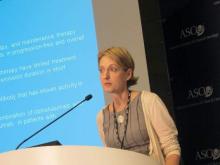CHICAGO – Progression-free survival for patients with rituximab-refractory indolent non-Hodgkin’s lymphoma was effectively doubled with a combination of obinutuzumab and bendamustine, compared with bendamustine alone.
In a randomized trial halted early because of the evident superiority of the combination over bendamustine monotherapy, at a median follow-up of 20 months the median progression-free survival as assessed by an independent radiology facility had not been reached for patients treated with obinutuzumab (Gazyva) and bendamustine, vs. 14.9 months for bendamustine alone. As assessed by the investigators, the median PFS rates were 29 months and 14 months, respectively, reported Dr. Laurie Helen Sehn, a medical oncologist at the British Columbia (Canada) Cancer Agency in Vancouver.
“The combination of obinutuzumab [and bendamustine], followed by obinutuzumab maintenance, resulted in a statistically significant, but more importantly, a clinically meaningful increase in progression-free survival compared with bendamustine alone,” Dr. Sehn said at a briefing at the annual meeting of the American Society of Clinical Oncology.
“This study is remarkable, because it does demonstrate the first randomized evidence of a clinical benefit of a novel anti-CD20 monoclonal antibody for patients who are rituximab refractory,” she added.
The advent of the anti-CD20 antibody rituximab in the later 1990s transformed treatment of hematologic malignancies, including indolent non-Hodgkin’s lymphomas. However, some patients have disease that is resistant to rituximab or recurs after rituximab therapy, and for these patients treatment options are limited.
Bendamustine (Treanda) has been shown to be effective in patients with rituximab-refractory indolent NHL, but with remission durations of only 7-9 months.
Obinutuzumab is a glycoengineered anti-CD20 antibody that ASCO expert Dr. Merry-Jennifer Markham from the University of Florida in Gainesville called “a super-rituximab.” It has been shown in preclinical studies to have activity against malignancies when combined with bendamustine.
In the GADOLIN trial, 413 patients with rituximab-refractory indolent NHL histologies were randomly assigned to receive either obinutuzumab 1,000 mg on days 1, 8 and 15 of the first 28-day cycle and then on day 1 of subsequent cycles plus bendamustine 90 mg/m2 per day on days 1 and 2 of the first six cycles, or only bendamustine 120 mg/m2 per day on the same schedule.
The NHL subtypes treated included follicular lymphomas, marginal zone lymphomas and small lymphocytic lymphomas.
For patients assigned to obinutuzumab, treatment continued until a determination of complete or partial response or stable disease, and were then continued on obinutuzumab maintenance, at a dose of 1,000 mg every 2 months for up to 2 years, or until disease progression.
Median follow-up was 23 months for the combination arm, and 20 months in the bendamustine only arm.
At the first planned interim analysis, the median PFS by independent radiology review, the primary endpoint, was not reached among patients in the combination, compared with 14.9 months for bendamustine. This translated into a hazard ratio of 0.55 (P = .0001), and prompted the data safety monitoring committee to recommend ending the trial.
The safety analysis showed that the overall rates of adverse events, serious adverse events, grade 3 or great events, deaths and withdrawals were similar between the two trial arms, Dr. Sehn said.
“The safety profile revealed no new safety finding and was in keeping with what was expected with the combination of drugs,” Dr. Sehn said.
“The fact that these responses and the progression-free survival responses were so robust in a population that has already received an anti-CD20 agent is remarkable, and I think this really does open up the therapies that will lead to substantial time for these patients, who are all incurable,” Dr. Markham said in an interview. She was not involved in the GADOLIN trial.


